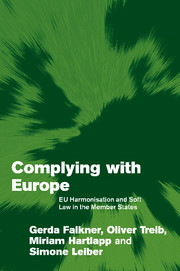Book contents
- Front matter
- Contents
- List of figures
- List of tables
- Preface
- 1 Introduction: flexible EU governance in domestic practice
- 2 Theorising the domestic impact of EU law: the state of the art and beyond
- 3 EU social policy over time: the role of Directives
- 4 The Employment Contract Information Directive: a small but useful social complement to the internal market
- 5 The Pregnant Workers Directive: European social policy between protection and employability
- 6 The Working Time Directive: European standards taken hostage by domestic politics
- 7 The Young Workers Directive: a safety net with holes
- 8 The Parental Leave Directive: compulsory policy innovation and voluntary over-implementation
- 9 The Part-time Work Directive: a facilitator of national reforms
- 10 Voluntary reforms triggered by the Directives
- 11 The EU Commission and (non-)compliance in the member states
- 12 Beyond policy change: convergence of national public–private relations?
- 13 Implementation across countries and Directives
- 14 Why do member states fail to comply? Testing the hypotheses suggested in the literature
- 15 Three worlds of compliance: a typology
- 16 Conclusions: myth and reality of social Europe
- References
- Index
8 - The Parental Leave Directive: compulsory policy innovation and voluntary over-implementation
Published online by Cambridge University Press: 22 September 2009
- Front matter
- Contents
- List of figures
- List of tables
- Preface
- 1 Introduction: flexible EU governance in domestic practice
- 2 Theorising the domestic impact of EU law: the state of the art and beyond
- 3 EU social policy over time: the role of Directives
- 4 The Employment Contract Information Directive: a small but useful social complement to the internal market
- 5 The Pregnant Workers Directive: European social policy between protection and employability
- 6 The Working Time Directive: European standards taken hostage by domestic politics
- 7 The Young Workers Directive: a safety net with holes
- 8 The Parental Leave Directive: compulsory policy innovation and voluntary over-implementation
- 9 The Part-time Work Directive: a facilitator of national reforms
- 10 Voluntary reforms triggered by the Directives
- 11 The EU Commission and (non-)compliance in the member states
- 12 Beyond policy change: convergence of national public–private relations?
- 13 Implementation across countries and Directives
- 14 Why do member states fail to comply? Testing the hypotheses suggested in the literature
- 15 Three worlds of compliance: a typology
- 16 Conclusions: myth and reality of social Europe
- References
- Index
Summary
Aim and content of the Directive
The Parental Leave Directive was the first EU-level social policy measure tobe based on a framework agreement by the major European federations of management and labour (UNICE, CEEP, and ETUC). The Parental Leave Directive did no more than give general legal force to the social partners pact. None of the latter's substantive provisions was modified, which is best illustrated by the fact that the agreement was attached, unchanged, to the Directive.
The general aim of the Directive is, according to the preamble preceding the main text of the social partners agreement, ‘to set out minimum requirements on parental leave and time off from work on grounds of force majeure, as an important means of reconciling work and family life and promoting equal opportunities and treatment between men and women’. The purpose of the agreement is therefore to enable working parents to take a certain amount of time off from work to take care of their children. In this context, particular emphasis is put on enabling and encouraging men to take on a greater share of childcare responsibilities.
The compulsory minimum standards of the Directive thus encompass seven provisions:
workers must be granted the right to at least three months' parental leave;
this entitlement is to be an individual right of both male and female workers;
parental leave has to be provided not only for parents with children by birth, but also for those who have adopted a child;
- Type
- Chapter
- Information
- Complying with EuropeEU Harmonisation and Soft Law in the Member States, pp. 140 - 158Publisher: Cambridge University PressPrint publication year: 2005
- 1
- Cited by

